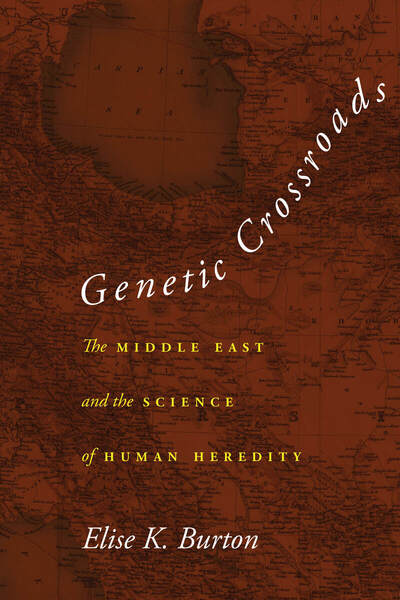
2021
400 pages.
from $32.00
Paperback now $16.00 (50% off)
Hardcover ISBN: 9781503611917
Paperback ISBN: 9781503614567
Ebook ISBN: 9781503614574
Winner of the 2021 Nikki Keddie Book Award, sponsored by the Middle East Studies Association (MESA).
Bronze Medal (tie) in the 2022 Independent Publisher Book Awards (IPPYs) - History (World) Category.
The Middle East plays a major role in the history of genetic science. Early in the twentieth century, technological breakthroughs in human genetics coincided with the birth of modern Middle Eastern nation-states, who proclaimed that the region's ancient history—as a cradle of civilizations and crossroads of humankind—was preserved in the bones and blood of their citizens. Using letters and publications from the 1920s to the present, Elise K. Burton follows the field expeditions and hospital surveys that scrutinized the bodies of tribal nomads and religious minorities. These studies, geneticists claim, not only detect the living descendants of biblical civilizations but also reveal the deeper past of human evolution.
Genetic Crossroads is an unprecedented history of human genetics in the Middle East, from its roots in colonial anthropology and medicine to recent genome sequencing projects. It illuminates how scientists from Turkey to Yemen, Egypt to Iran, transformed genetic data into territorial claims and national origin myths. Burton shows why such nationalist appropriations of genetics are not local or temporary aberrations, but rather the enduring foundations of international scientific interest in Middle Eastern populations to this day.
About the author
Elise K. Burton is Assistant Professor at the Institute for the History and Philosophy of Science and Technology, University of Toronto.
"Genetic Crossroads is a shining example of how to write multi-scalar, multi-sited, and multi-lingual histories of science. Few scholars are able to balance the contradictory pulls of the global and the local; Elise Burton shows how they can be effectively braided together without sacrificing critique, complexity, or context."
—Projit Bihari Mukharji, University of Pennsylvania
"Deeply researched and powerfully written, Genetic Crossroads is one of the most original books I have read in a decade. Burton's unique history of Middle Eastern genetics is a fascinating study of genetic nationalism and the global hierarchies of such scientific inquiry, and a must-read for historians of all fields."
—Eve M Troutt Powell, University of Pennsylvania
"Drawing on sources in four Middle Eastern languages and from underused Western archives, Elise Burton explains why the Middle East was so pivotal for global genetics. Exemplifying how to integrate area studies and global history, Genetic Crossroads is a true tour de force."
—Cyrus Schayegh, Graduate Institute of International and Development Studies, Geneva
"Genetic Crossroads exposes how technical and scientific projects about human ethnicity underpinned nationalist ideologies across the twentieth century. Burton introduces a novel angle to established debates, showing how scientific researchers nourished racial mythologies, and how those mythologies drove the researchers themselves. She draws disparate literatures into a single intervention, extending isolated national stories through her integrative original research. The book is remarkable for its breadth of coverage in time, space, and language; every reader will find something that engages their area of curiosity or expertise."
—Committee for the Nikki Keddie Book Award, sponsored by the Middle East Studies Association
"Genetic Crossroads: The Middle East and the Science of Human Heredity by Elise Burton, is a sweeping history of 'genetic nationalism' in the 20th century covering Iran, Turkey, Israel, Lebanon, Egypt and other Arab countries."
—Usman Butt, Middle East Monitor
"It is difficult to do justice to this exceptional endeavor. The advantages of the integrative thematic approach adopted by Burton are numerous. Most importantly, it allows the book to be both deeply contextual on some significant levels, and yet driven by a strong argument, by strong structuring hypotheses. Its implied periodization is derived from this combination of context and content. It makes room for sophisticated many-layered comparisons, for complex plot. The book affords both a generalized perspective and delves into great detail on specific issues."
—Snait B. Gissis, History and Philosophy of the Life Sciences
"Genetic Crossroadsis a brilliant book that will surely become a milestone in the study of the global science of human genetics. In putting to use her dual expertise in Middle Eastern studies and the history of science, Burton provides an unprecedented perspective on themes, such as race and ancestry, that are re-dimensioned and relocated in their relevance to others."
—Isis: A Journal of the History of Science Society